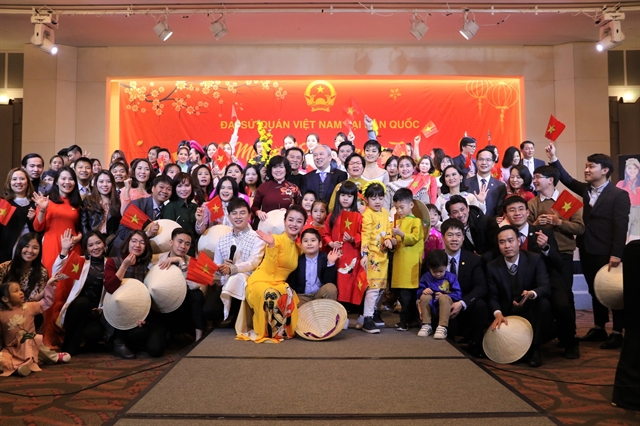 Society
Society

Although overseas Vietnamese labourers don't have many days off during the traditional Vietnamese new year holiday, they have their own ways to celebrate Tết.

|
| A party to celebrate Lunar New Year 2020 was celebrated at the Vietnamese Embassy in the Republic of Korea. VNA/VNS Photo Hữu Tuyên |
HÀ NỘI - Returning home to be with your family for Tết (Lunar New Year) is a wonderful feeling, but not all Vietnamese people working and studying overseas can come back for the festive season.
Although overseas Vietnamese labourers don't have many days off during the traditional Vietnamese new year holiday, they have their own ways to celebrate Tết.
Nguyễn Thanh Tú, from central Thanh Hóa Province, works for an automobile company in Busan, South Korea and said he would spend three days off celebrating New Year's Eve with other Vietnamese workers, making traditional Vietnamese food and visiting his friends around the city.
It will be the third holiday he has welcomed Tết away from home.
“Besides chưng cake, Vietnamese sausages and peach blossom sent from Việt Nam, we also prepare boiled chicken, sticky rice, cake and fruits to perform ritual offerings to our ancestors on New Year's Eve,” he told Nông Thôn Ngày Nay (Countryside Today) newspaper.
“On New Year's Eve when I call my family in Việt Nam, I always can't help but burst into tears.”
There are currently nearly 150,000 Vietnamese people living in South Korea. The Vietnamese embassy in South Korea every year holds a Tet party for the Vietnamese community.
There are more than 371,000 Vietnamese people living in Japan, most of whom are labourers and post-graduate students.
Tô Thiên Mệnh, who works for Nissan in Japan, has welcomed Tết far from home eight times. Last year and this year he has been lucky to welcome the new year with his wife and children.
“Welcoming Tết with my wife and children, I feel less homesick. My family will visit our friends and travel to some places in Japan for this year’s holiday,” he said.
The Vietnamese community in Japan has prepared for Tet since the beginning of November. As well as post-graduates, a lot of Vietnamese families will welcome Tết far from home.
Mệnh's company alone has about 400 staff living in three separate dorms. Due to the distance between dorms, all of the staff can not gather in one place. Every year the three dorms choose one day to celebrate New Year together through an online livestream.
“We hope that Tết far away from home will be full of warmth and joy. More importantly, we want our children to understand the meaning of the homeland’s traditional new year although they were not born in Việt Nam,” Mệnh said.
Mệnh and his friends still retain Tết practices such as preparing New Year Eve’s offerings, xông đất (first footing) and hái lộc (picking luck or snapping off a peach blossom branch from a tree on the grounds for the family shrine).
Vũ Trường Giang, a representative of Japan-Europe-Southeast Asia Division of Overseas Labour Management Department, Ministry of Labour, Invalids and Social Affairs, said labourers working overseas suffer many difficulties. Although they have good and high-paid jobs, most of them lack affection, especially during the new year holiday.
There are hundreds of thousands of Vietnamese labourers working overseas in 40 countries and territories.
Businesses which send Vietnamese overseas every year present gifts to labourers welcoming Tết far from home.
Lê Nhật Tân, deputy director of LOD Labour Export Company, said the firm sends chưng cakes, candy and Vietnamese sausages to overseas labourers. The new labourers from Việt Nam send the presents to the labourers living far from home for years.
For those who are luckier to return home, the Vietnamese Ministry of Foreign Affairs holds the Homeland Spring festival, an annual gathering of Vietnamese living across the world, on January 18 in Hà Nội and Bắc Ninh. VNS